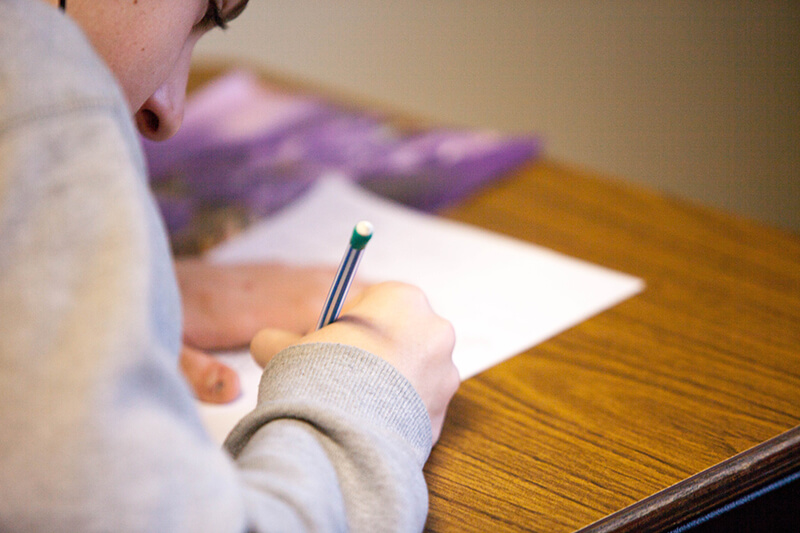
How to Write a Reflection Paper That’s Both Insightful and Effective
 Trying to figure out how to write a reflection paper and not really sure where to start? This type of assignment is a deviation from the academic norm, so it’s natural to have a few questions about what it is you’re supposed to be doing.
Trying to figure out how to write a reflection paper and not really sure where to start? This type of assignment is a deviation from the academic norm, so it’s natural to have a few questions about what it is you’re supposed to be doing.
A reflection paper is a refreshing type of assignment that can offer you a break from the more rigorous research papers and argumentative essays you’re used to writing. This gives you a chance to write your own thoughts and opinions on something from a more personal perspective instead of gathering evidence and making fact-based points. You get a chance to speak your mind instead of producing conclusions from other peoples’ work.
However, at the end of the day, this is still an academic paper that you’re going to be turning in as part of your grade. You’ll need to know what it takes to make sure your reflection paper gets you that A. Fortunately, we are always here to help. This guide will show you exactly how to write a reflection paper so you can get ahead in any of your classes.

What Exactly is a Reflection Paper?
An important first step to learning how to write a reflection paper that will get you the best grade is understanding what exactly you need to be doing. Therefore, first we need to discuss what a reflection paper actually is.
The goal of a reflection paper is to write a critical reflection with your thoughts and perception of a particular work or subject. In other words, a reflection paper is a written personal reflection on your thoughts and ideas about a particular piece, such as a book, article, movie, or speech. You could write a reflection paper on just about anything, from your views on how the universe works to your thoughts about your favourite movie. In an academic context, you’ll often be asked to write a reflection on an academic journal article, an expert theory, or a particular text you’re studying.
Writing a reflection paper is a great way to get in touch with your own thoughts and emotions and reflect on how you really feel about a specific topic or subject. Learning how to analyze a text and think about it in reflective terms is also a great way to practice your critical and analytical skills for the rest of your academic and professional career.
The Difference Between a Reflection Paper and an Academic Paper
When you’re trying to learn how to write a reflection paper, it’s important that you understand the difference between a critical reflection and an academic paper, such as a research paper or expository essay.
A key difference between the two is that a reflection paper can be in the first person, while an academic paper should always be written in third person. This doesn’t mean you can start using slang and casual language, but it does mean that you can get more personal in your writing.
Another key difference is the structure of the paper. An academic essay follows a specific 5-point structure where each body paragraph is dedicated to proving a main point in the thesis statement. A reflection paper can be written in a more open structure, with each paragraph integrating or exploring a new experience, idea, or perspective – like a journal instead of an essay.
Don’t get caught up in the idea that a reflection paper is a personal essay where you’re free to write as if you’re talking to a friend. While it isn’t the same as an academic paper, your reflection should still follow formal and academic guidelines for writing, including proper grammar and a professional tone.
The University of Toronto provides some examples of how you can differentiate between the two types of writing and make sure that your critical reflection follows the right conventions.

Types of Reflection Papers
Now that you know what the assignment is, if you really want to learn how to write a reflection paper, you should know what type of paper you have to write. While the goal of most reflection papers is the same, to showcase your thoughts and opinions, there are a few different types you may be required to do.
Here are some of the types of reflection papers out there that you may be assigned at some point:
● Personal Reflection: In a personal reflection, you’ll explore your opinions, thoughts, and feelings on a particular topic.
● Educational Reflection: This is the most common type of reflection paper you will be assigned in college or university. An educational reflection is your personal response to a book, movie, article, or lecture that showcases what you’ve learned and how you’ve interpreted the subject.
● Professional Reflection: A type of reflection usually used with fields such as teaching and social work, a professional reflection is used to analyze professional behaviour and development within a particular setting.
● Self-Reflection: At some point, you may be asked to write a self-reflection. Usually it’ll be assigned after a major project or presentation, or at the end of a course. This type of reflection doesn’t really need to be as formal and is usually your professor’s way of checking in to see how you’ve learned and grown in the class.
● Experiential Reflection: Usually used within fields where theory is applied to practice, such as in nursing or business, an experiential reflection requires you to take concepts you’ve learned and connect them to practical experience within the field.

The Elements of a Good Reflection Paper
Since your reflection paper is a personal perspective where you point out your opinions and viewpoints, there isn’t really a wrong answer. Therefore, since it’s so subjective, you might be wondering how exactly your professor is going to be grading your assignment.
Ultimately, your professor will analyze the way you’ve communicated your point, the connections you’ve made to broader ideas, and the way you have interpreted your own perception. They are looking for you to self-analyze and address the way that your personal experiences have shaped your view on the world around you.
Here are some elements that your professor will be looking for in your reflection paper:
● Your personal connection to the subject material.
● A connection between this subject and the broader context of your course or class.
● Your ability to deconstruct the material and recognize how your own experiences shape your interpretation.
● Clear, cohesive writing and organized flow throughout your paper.
● A re-evaluation of your own ideas and how they have been impacted by the subject at hand.
How to Put Together a Critical Reflection
When it’s time to brainstorm, start by writing down the main topics, themes, or points of the subject you’re writing about. Next, consider your personal response or opinion about those topics. Then, make connections between the topics and your thoughts and use them to form your reflection.
Here are some questions to ask yourself as you go through the subject material:
● How does this material connect to my culture, beliefs, religion, personal experiences, or emotions?
● Does this material challenge or reinforce my own existing ideas?
● How does this particular message or point make me feel? What type of reaction does this information produce in me?
● What elements of this subject caught my attention the most?
● Does anything in this material change my mind about the subject?
● What are the major themes here, and how do they relate to the course I’m taking?
● Is there anything new that you’ve learned about this subject?
● What is the significance of this subject? In other words, why do I care about it?
Writing a Reflection Paper Outline
Once you’ve gotten the hang of gathering your thoughts and learning to analyze the material, the next part of the process of learning how to write a reflection paper is the writing process.
It all starts with your outline. Regardless of how subjective and opinion-based it is, a reflection paper is still a type of academic paper. Therefore, it still needs to be organized effectively and follow proper college/university paper format. An outline will help you stay organized and make sure that your writing is structured in a way that makes a clear point.
When you write all of your ideas down in an outline, you can get a great visual representation of the content you want to include and where it should go in terms of the order of the paper. This way, you can move something around if it makes more sense to present it before a different point, and you can give yourself an idea of what areas you should be focusing on.
For more tips on how to write a structured essay outline, check out Episode 47 of The Homework Help Show, where we walk you through the process.
Following The Right Format
Now that you know what you need to do, the next step in nailing down how to write a reflection paper is understanding the format and structure.
The first thing you need to do is check the formatting requirements your professor has given you. This includes the referencing style you need to use. Even if you aren’t planning on using any citations from an original source within your paper, you still need to check the referencing style to make sure the paper is formatted properly.
For example, in MLA referencing style, you don’t need to include a title page but you need a running header with your last name and the page number. Meanwhile, APA citation requires a title page as well as a specific running header.
Once you’ve understood the formatting requirements, make sure you’re on the right track in terms of your content. Depending on which type of reflection paper you have to write, you’ll need to make sure you outline the structure properly. For example, when writing an educational reflection paper about a movie, you may want to start out by giving some background context of the plot or messages within the film before you start talking about your opinions.

Writing Your Reflection Paper
It’s time to start writing! In this section, we’re going to go through each part of the process and you’ll learn how to write a reflection paper from start to finish.
The Introduction: Your introduction should outline any expectations you had going into the material, as well as the position you originally had. This is also the part of your paper where you introduce the topic you’ll be reflecting on.
The thesis statement for a reflection paper should offer a brief explanation of how you arrived at your conclusions from your expectations. In other words, this should be a brief, direct summary that tells your reader if those expectations were met, or if they changed based on the subject material. You don’t need to follow the basic point-by-point structure you’d use in an academic essay thesis statement, but you do need to be clear about what you’re going to be discussing and the main point of your paper.
Here is an example: “As a lifelong vegetarian, I was always against animal cruelty; however, reading Margaret Groffman’s article “Animal Testing Alternatives,” I have come to the understanding that society needs to take a more proactive approach to reducing animal testing.”
The Body Paragraphs: Next, your body paragraphs should focus on the various conclusions you’ve made about the points in the material and your connections with them. These paragraphs should be structured like you would normally write them in an academic essay, with a topic sentence, supporting evidence, and transitions. Make sure each body paragraph has one clear point.
The Conclusion: End with a strong conclusion. Here is where you can tie all of your insights and ideas together, and summarize the points you’ve made in your reflection. First, restate your thesis. Then, talk about the overall lessons you’ve learned, how your perspective has changed, and anything else you want to use to wrap up your ideas.
Need more help putting together your academic paper? Download our FREE essay writing ebook! This massive essay writing guide features over 150 pages of step by step instructions on how to write an amazing essay for any class, no matter what type of paper you have to write.

Tips For Good Reflective Writing
The ultimate point of reflective writing is to use your own experiences, thoughts, and beliefs to make personal connections with materials or subjects, and recognize how those personal perceptions shape the way you consume information.
Part of the process of learning how to write a reflection paper includes improving your own reflective writing skills. Here are some quick tips to help you out:
● Avoid writing a summary of the material. This is a reflection paper, not an article summary.
● Pick out specific points from the text, quote them, and then analyze them with your own perception.
● Don’t write out your life story when you’re relating to a specific point. The reader only needs to know your experiences or beliefs when it relates directly to the point you’re making or associating with.
● Always use an academic or professional tone. Just because you can write in first person doesn’t mean you can start to write casually or toss grammar rules out the window.
● Consider the length requirements of your paper. If you’re working with a smaller length, like 500 words, try to stick to only the most important points and stay focused.
● Avoid going off on tangents with your own opinions. Keep it short, sweet, and to the point.
● Read some examples of reflection papers to give you an idea of how to gather your own thoughts.
● When writing a professional or experiential reflection, make sure you address the learning goals and objectives you started out with so you can properly analyze your progress.
You Don’t Have to Know How to Write a Reflection Paper When You Have Homework Help Global on Your Side
If you’re tired of learning about how to write a reflection paper, it’s time to enlist the help of a team of professionals. Hiring a professional to do the job for you can take a load off your shoulders, freeing up your time to focus on other projects, your job, or even your social life. Instead of pulling those all-nighters living off pots of coffee, you can just hand over your assignment and take that stress away entirely.
At Homework Help Global, our team of essay writers and scholars are proficient in a variety of academic disciplines and have been writing reflection papers for many years. We know exactly what it takes to impress your professor and turn in a paper that will help you get your grades to where they need to be.
Get a free quote for your reflection paper now or fill out the order form to get started right away. To learn more about how it works, check out our process here.
Share:

